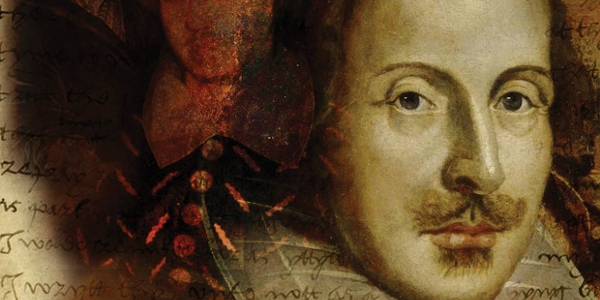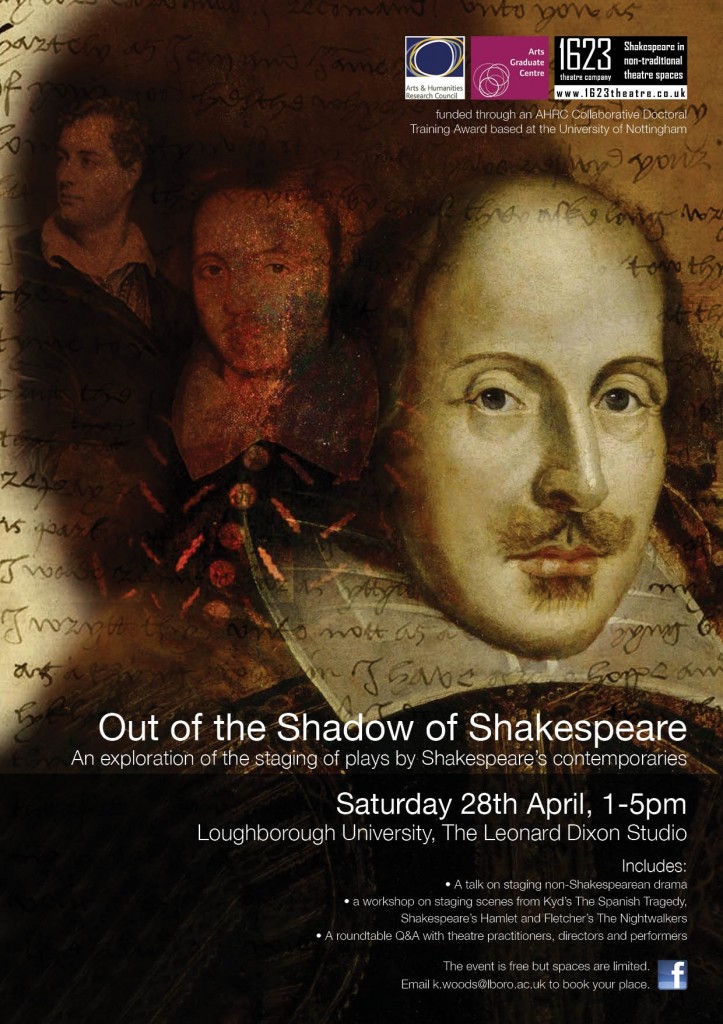
July 27, 2012, by Peter Kirwan
Out of the Shadow of Shakespeare
 Shakespeare casts a long shadow. Particularly in this Olympic year, he’s absolutely everywhere – in a new exhibition at the British Museum, in the World Shakespeare Festival of performances taking place around the country (which I’ll be revisiting in my next post), and even during the Opening Ceremony of the Olympics themselves, which is based partly around Shakespeare’s The Tempest. More prosaically, Shakespeare is the last remaining compulsory author on school curricula and the only dramatist to have a Royal acting company devoted to his works. If you scroll down the School of English staff list, he’s the only author to have a lecturer dedicated specifically to him (me).
Shakespeare casts a long shadow. Particularly in this Olympic year, he’s absolutely everywhere – in a new exhibition at the British Museum, in the World Shakespeare Festival of performances taking place around the country (which I’ll be revisiting in my next post), and even during the Opening Ceremony of the Olympics themselves, which is based partly around Shakespeare’s The Tempest. More prosaically, Shakespeare is the last remaining compulsory author on school curricula and the only dramatist to have a Royal acting company devoted to his works. If you scroll down the School of English staff list, he’s the only author to have a lecturer dedicated specifically to him (me).
The dominance of Shakespeare sometimes means that we forget he was one of a number of playwrights working in the early modern theatre (the other half of my job title), whose works often get overshadowed as a result. While several academics devote themselves to keeping the wider drama of the period alive in criticism and editions (including several of us in the School of English), it’s far rarer for theatre companies to invest in producing the plays.
Recently, a Nottingham-based AHRC Collaborative Doctoral Training Award funded a one-day symposium at Loughborough University. Academics, students and practitioners gathered to discuss the issues surrounding the performance of non-Shakespeare early modern drama, and to try out some scenes from some of these plays. The Artistic Directors of two young Midlands theatre companies, Blood and Thunder and 1623 joined us for the day to bring their ‘front line’ experience of producing and experimenting with these plays.
The event website gives a full rundown of what took place on the day. Kelley Costigan (Blood and Thunder) gave a keynote lecture about her company’s experience of mounting John Webster’s The Duchess of Malfi in Stratford-upon-Avon and the practical difficulties encountered in attempting to fund a non-Shakespearean production. Ben Spiller (1623) then ran an afternoon workshop with several of his actors, walking through ghost scenes from the relatively famous The Spanish Tragedy by Thomas Kyd and the very obscure John Fletcher play The Night Walker, a play which few of the audience knew but proved, with just half an hour’s work, to be both hysterically funny and endlessly open to reinterpretation.
As a one-day event, ‘Out of the Shadow of Shakespeare’ was a timely reminder of Nottingham’s commitment to getting away from the established canon. As a long term project, though, a closing round-table made clear that it will take a great deal more investment from funding councils to get these plays onto the professional stage.
What can academics do to help this? Well, we can at least get the plays out there. Brean Hammond’s new text of Double Falsehood in 2010 was followed by at least three professional productions of this rarely-performed play in the UK and USA. Major theatres like making use of new editions, as shown by the National Theatre’s success with the 2007 Oxford Collected Works of Thomas Middleton, or Cheek by Jowl’s use of a new edition of John Ford’s ‘Tis Pity She’s a Whore. The drama team at Nottingham are involved in several major projects to produce good new texts of some of our forgotten gems, including new editions of the complete works of Ben Jonson and James Shirley, and a new volume of anonymous plays once attributed to Shakespeare, all of which are designed to be usable by theatre practitioners as well as readers. It’s a small start, but an important contribution to getting early modern drama out of the shadow of Shakespeare.
No comments yet, fill out a comment to be the first

Leave a Reply